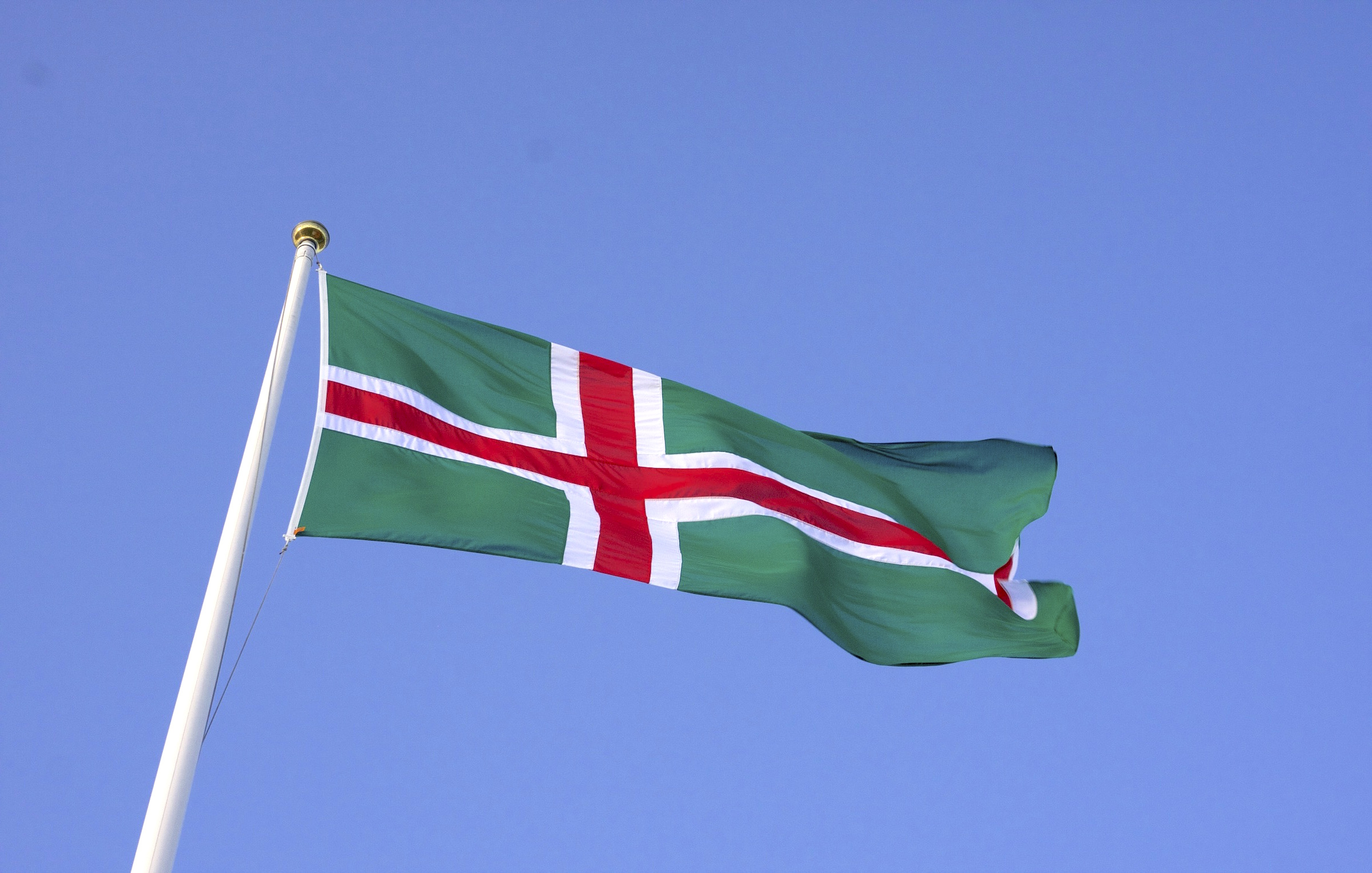 |
| The real flag of Småland... but quite similar to the one seen in the TV series! Credit: FlaggorOnline.se |
“Det finns inga smålänningar” is a four-part
Swedish TV series first aired in 1981 (and probably never aired since). It´s
easily the most controversial production ever shown on SVT (Swedish public
service television). A total of 164 complaints were registered with Radionämnden,
the government agency tasked with overseeing public service TV and radio in Sweden.
In the end, Radionämnden decided not to take any action. Critics in the media accused
the series of being absurd, partisan, anti-Israeli and anti-Semitic, but many
also called it “pretentious twaddle” and considered it an embarrassment for SVT.
Absurd and confusing were other judgments. And yes, it´s about the Israel-Palestine
conflict!
The series retells the conflict between Jews/Israelis
and Arabs/Palestinians in allegoric form, placing it on an alternate timeline
in which a broadly similar conflict takes place in Sweden. The point of the
exercise is presumably to make it easier for the average Swedish TV viewer to
identify with the Palestinians, since they are recast as Swedish-speaking
peasants living in refugee camps, but if that was the intention, it probably
failed. Instead, “Det finns inga smålänningar” gives a chaotic and surrealistic
impression, and frequently comes across as a real turkey. Pro-Palestinian activists
could probably decode the various esoteric references in the series, but I doubt
anybody else came even close. I actually watched the first episode as a kid, didn´t
get half of it, and never watched the rest – until now (it´s available on SVT
Play, but can only be seen in Sweden). Interestingly, I remember it being even
more surreal than it actually was!
The title “Det finns inga smålänningar” means ”There are no Smålanders”, Småland being a historical province of Sweden. It´s a reference to Golda Meir´s notorious statement “There are no Palestinians”. In the series, Småland symbolizes Palestine, the town of Jönköping being Jerusalem. That´s actually quite apt, since Jönköping is often jokingly called “Småland´s Jerusalem” due to its large evangelical Christian community. The area of Värend in Småland symbolizes Israel, and its inhabitants (known as “virdar”) are a stand-in for the Jews. Zionism is called “viridism” in the series, a wholly fictitious concept! The forces of Värend expel the other Smålanders (= the Palestinians) in a bloody war of conquest. Östergötland is Lebanon, Västergötland is Syria and Skåne (Scania) is Egypt. Öresund is the Suez Canal. Somewhat confusingly, the rest of Sweden symbolizes the real Sweden, while no equivalent of Jordan has been included.
The PLO is called the Småland Liberation Organization (SBO) and its leader does look like a convincing cross between Arafat and Castro. The Smålandian militant Lisa Jonsson is clearly based on the PFLP terrorist Leila Khaled. Like her real counterpart, Lisa hijacks an airplane and blows it up. The Smålanders are depicted as simple rural folk who suffer in refugee camps without ever really “getting it”, expect for the younger generation who goes on to form the militant SBO. It struck me that this could be an allegory for young people during the 1970´s becoming leftist radicals, while their parents and grandparents are apolitical and aloof.
Indeed, the entire series could be taken as a fantasy of a revolution in 1970´s Sweden, with the Smålander-Palestinians being "the working class" or "the common people", the treacherous Arab leaders really being the Social Democrats, and so on. At one point, the displaced Smålanders clearly symbolize 1970´s immigrants in Sweden looking for gainful employment, not Palestinians in the Middle East. Maybe it´s a double allegory? Even the use of folk music – which looks rural and traditional – is really
a 1970´s Swedish leftist thing in context, since “progressive” music was
sometimes “folksy”.
It was (of course) the series´ sympathetic portrayal of the Palestinians, including the PLO, that made it intensely controversial. Today, a pro-Israeli series would probably be seen as far worse, which may tell us how (purported) public opinion has shifted since 1981. But, as already indicated, “Det finns inga smålänningar” is so absurdistic that it´s difficult to believe that *it* moved the needle!
On one point, I actually found the series quite
funny: the reporter Valter Ersson is depicted as vain, careerist, uncomprehending
towards the plight of the refugees, and even something of a fake. While this
may be an unfair caricature of an actual foreign news correspondent, it does
capture a certain breed of “intellectuals” almost to a tee. The series is also
hilariously precocious: in one episode, one of Ersson´s colleagues says that
anything pro-Småland (i.e. pro-Palestinian) will surely be reported to
Radionämnden! Go figure.
I think it´s pretty obvious why I decided
to watch “There are no Smålanders” now. Let´s face it, the fact that SVT could
show an anti-Zionist/pro-hijacker propaganda production in 1981 and get away with
it, probably does tell us something of our Woke predicament. But, to repeat myself again,
“Det finns inga smålänningar” in itself is so peculiar that I suspect it had
very little effect on public opinion either way. Even today, it comes across
more like a monument to the stranger strands of the 1970´s left-intellectual
mindset...
No comments:
Post a Comment